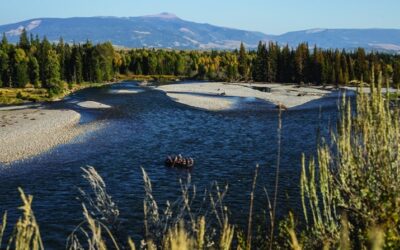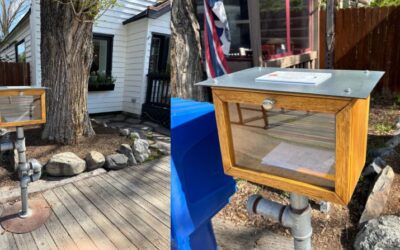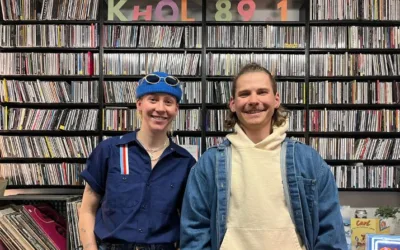Ryan Stolp is a cartoonist, illustrator and marketing professional based here in Jackson. He’s also the co-founder of Orijin Media, a full-service digital and marketing agency, as well as the creator of the popular Lift Lines comics, a three-times-per-week comic published in the Jackson Hole News&Guide.
In advance of the release of his graphic novel, “The Ski Town Fairytale,” which is about the unique difficulties of trying to make it work in a mountain town, Stolp joined us recently in the KHOL studios.
The following interview transcript has been edited for clarity and brevity. Listen above for the full conversation.
JACK CATLIN/KHOL: The Lift Line’s Instagram account has become a valuable community forum where people from all sides can comment. Do you set out to provoke discussion or does it just happen naturally?
RYAN STOLP: I think Lift Lines, in particular, is a really special avenue because it kind of allows a public commentary on a local event or national event, but everyone’s kind of in on the mountain town context. So I can pull some different levers that a national cartoonist might not. It does draw a lot of different-sided comments. There’s been a lot of vitriol on there. There were hundreds of comments and anger on both sides. It’s been really surprising and a little disheartening sometimes to just see people talking past each other. And a lot of people are like, “Oh, Ryan, you need to block that person. You need to delete these comments.” And I see the algorithm at work and I see the echo chamber and who it’s putting my comic in front of. And I really feel like deleting someone’s comments because you don’t agree with them just doesn’t help it, even if it’s not the healthiest conversation. I think it’s important to everyone to air their laundry and I would say there are a couple of instances where people have come around to some mutual understanding, and that definitely makes it makes it worth it.
KHOL: Your graphic novel, who you co-authored with Sam Morse, is called “The Ski Town Fairytale,” and it’s about chasing the dream in a ski town. What made you decide to make a form graphic novel and how did the concept come to be?
STOLP: So Sam Morse used to live in Jackson, and he wrote “The Bumion,” which was a TGR kind of like graphic, satirical post. And he moved to Salt Lake City a couple of years ago and ended up reaching out to me because he knew Lift Lines. And he had been mulling over this idea of a ski town fairy tale and he really wanted to tell a kind of deeper story about ski towns. I think it gets idolized and kind of put on a pedestal in a lot of ways, and he was someone that really dealt with all sides of the complexities of making it work here and had this concept for the ski town fairy tale. So it had some levers to pull in some tropes and a kind of moralistic component to it. He reached out to me, and we started riffing on the idea and ended up putting together this deeper story and I told him like, “Hey, I really I want to draw in this style. I know that you know Lift Lines but I wanted a kind of new challenge.” Lift Lines is a quick get the concept out there, and this graphic novel is a much more intentional, polished kind of format.
KHOL: What exactly is that dream? And how has the vision of that dream shifted in recent years?
STOLP: The dream. We start the story off with FOMO, and it’s kind of a digital addiction. You know, everyone is curating their online worlds and their social media accounts. And I think that it’s easy to think that what you’re seeing on people’s feeds is them living the dream, but there’s certainly some self-editing that’s going on. So what is the dream? I think they’re kind of moralistic aspirations. You know, being true to yourself, adventuring, having fun and living in the moment, which the forces of society are always trying to kind of pull us away from. But I think that it’s getting more complicated. The world of work, you’re always plugged in. It’s harder to kind of be simple and be present. And then you have a lot of economic factors. So as outdoor recreation has exploded, there is a demand and a competition to live in these places. And there are regulations. You can’t camp your van like you used to in the 70s wherever you want. So it’s getting harder and harder and harder. Look at the rising price of lift tickets or the equipment to do things. So we discussed a lot about what it means to live the dream in developing this story. And hopefully, it starts a conversation because I think the dream is a bit of a mindset. It’s kind of how you approach life, and I think it needs to evolve beyond a place or a time or an activity because those things are really up for discussion right now as far as their viability.
KHOL: So the ski town, and specifically here in Jackson Hole, can feel like a bubble. A self-contained and sometimes crazy universe. What is it about the culture of ski towns that you think creates this kind of atmosphere?
STOLP: I’ve noticed living here, you’re kind of always like one foot in a vacation because the people around you are all on vacation and they’re here to spend money, go out every night, live in the moment and have fun. And when you are a resident here, you’re constantly buffeted by those winds. And then this status, and I think like honestly, the Instagram effect when you have people saying, “Oh, look where I live, it’s a beautiful place and I got stuck in a bison jam this morning.” I think Instagram has really elevated these places as a status symbol and created more competition with the limited space, housing, jobs and opportunities in these communities. That’s really turned up the heat on kind of like what it means to try and make it here. Coming from a progressive, artsy, really exciting city like Durham, North Carolina, it was cool to move to Jackson because I immediately knew that 90 percent of the people I would meet out kind of had a shared value system. It requires a certain amount of extra effort to live here, and I think when everyone can share in that kind of like, “Yeah, I’m really trying to make it work. I’m putting my values first and saying I’m willing to hold two jobs.” To be able to share in this lifestyle is really powerful and super cool. And I think it’s something that’s missing in a lot of people’s intentional day-to-day lives. I think that’s a silver lining, the beauty of a ski town. It does spit people out though. it’s kind of like a gap year for a lot of people, unfortunately. And whether you burn hot and fast and get ejected or you’re hanging on for dear life, there’s some weird dynamics that kind of compound and happen quicker in a time frame than maybe your arc had you lived in a different city.
KHOL: Sometimes it’s luck. Sometimes it’s not, you know.
STOLP: Totally, but it mirrors that living in the moment thing. You don’t know how long it’s going to last. I think you’re a local when every day you wake up and you’re like, “Is this where I need to be in a year? Can it work? Like, Am I going to regret being in this no man’s land?”
This coverage is funded in part with an Arts For All grant provided by the Town of Jackson and Teton County.





